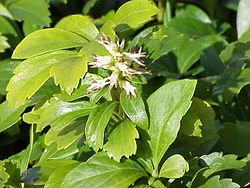Pachysandra
Genus of flowering plants From Wikipedia, the free encyclopedia
Pachysandra /ˌpækiˈsændrə/[1] is a genus of five species of evergreen perennials or subshrubs, belonging to the boxwood family Buxaceae. The species are native to eastern Asia and southeast North America, some reaching a height of 20–45 cm (7.9–17.7 in), with only weakly woody stems. The leaves are alternate, leathery, with a coarsely toothed margin, and are typically 5–10 cm (2.0–3.9 in) long. The small uni-sexual blooms are greenish-white and produced in late spring or early summer.[2]

| Pachysandra | |
|---|---|
 | |
| Pachysandra terminalis | |
| Scientific classification | |
| Kingdom: | Plantae |
| Clade: | Tracheophytes |
| Clade: | Angiosperms |
| Clade: | Eudicots |
| Order: | Buxales |
| Family: | Buxaceae |
| Genus: | Pachysandra Michx. |
| Species | |
|
See text | |
Etymology
Pachysandra is derived from the Ancient Greek word παχύς (pachýs, 'thick') and the Neo-Latin -androus ('of or pertaining to stamens'), and is a reference to the thick stamens.[3][4]
Species
- Pachysandra axillaris - China
- Pachysandra coriacea (sometimes classified as Sarcococca coriacea) - India, Nepal, Myanmar
- Pachysandra procumbens - Allegheny Pachysandra (southeast United States)
- Pachysandra stylosa - China (sometimes treated as a variety of P. axillaris[5])
- Pachysandra terminalis - China, Japan[6][7][8]
Cultivation and uses
Pachysandra can grow in deep-shade areas and is thus well-suited and popular as ground cover for shade gardens. There are several varieties used in the garden landscape, all of which are deer-resistant:
- The most commonly used species is P. terminalis, or Japanese spurge, which is an aggressively spreading evergreen ground cover.
- 'Variegata' has leaves attractively variegated green and creamy white, with a slower growth/spreading rate as P. terminalis.
- 'Green Sheen' Pachysandra has extra glossy dark green leaves and slowly spreads.
- 'Green Carpet' Pachysandra has deeper semi glossed green leaves than the common P. Terminalis, with prominent veining, more toothed serrations to the leaf edge, and a shorter more compact growth habit.[8]
All species in this genus prefer a well-drained soil with a high humus content.
References
External links
Wikiwand - on
Seamless Wikipedia browsing. On steroids.
